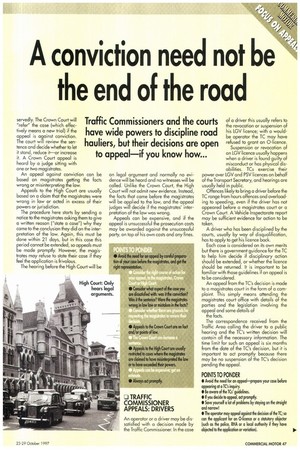A conviction need not be the end of the road
Page 49

If you've noticed an error in this article please click here to report it so we can fix it.
servedly. The Crown Court will "refer" the case (which effectively means a new trial) if the appeal is against conviction. The court will review the sentence and decide whether to let it stand, reduce it—or increase it, A Crown Court appeal is heard by a judge sitting with one or two magistrates.
An appeal against conviction can be based on magistrates getting the facts wrong or misinterpreting the law. Appeals to the High Court are usually based on a claim that the magistrates were wrong in law or acted in excess of their powers or jurisdiction.
The procedure here starts by sending a notice to the magistrates asking them to give a written reason ("state a case") why they came to the conclusion they did on the interpretation of the law. Again, this must be done within 21 days, but in this case this period cannot be extended, so appeals must be made promptly. However, the magistrates may refuse to state their case if they feel the application is frivolous. The hearing before the High Court will be on legal argument and normally no evidence will be heard and no witnesses will be called. Unlike the Crown Court, the High Court will not admit new evidence. Instead, the facts that came before the magistrates will be applied to the law, and the appeal judges will decide if the magistrates' interpretation of the law was wrong. Appeals can be expensive, and if the appeal is unsuccessful the prosecution costs may be awarded against the unsuccessful party, on top of his own casts and any fines. of a driver this usually refers to the revocation or suspension of his LGV licence; with a wouldbe operator the TC may have refused to grant an 0-licence. Suspension or revocation of an LGV licence usually happens when a driver is found guilty of misconduct or has physical disabilities. TCs exercise their power over LGV and PSV licences on behalf of the Transport Secretary, and hearings are usually held in public. Offences likely to bring a driver before the IC range from hours offences and overloading to speeding, even if the driver has not appeared before a magistrates court or a Crown Court. A Vehicle Inspectorate report may be sufficient evidence for action to be taken.
A driver who has been disciplined by the courts, usually by way of disqualification, has to apply to get his licence back. Each case is considered on its own merits but there is government guidance for the IC to help him decide if disciplinary action should be extended, or whether the licence should be returned. It is important to be familiar with those guidelines if an appeal is to be considered.
An appeal from the TC's decision is made to a magistrates court in the form of a complaint. This simply means attending the magistrates court office with details of the parties and the legislation involving the appeal and some details of the Facts.
The correspondence received from the Traffic Area calling the driver to a public hearing and the TC's written decision will contain all the necessary information. The time limit for such an appeal is six months from the date of the TC's decision, but it is important to act promptly because there may be no suspension of the IC's decision pending the appeal.
POINTS TO PONDER
• Avoid the need for an appeal—prepare your case before appearing at a TC's inquiry.
• Be aware of the Ks' guidelines.
• If you decide to appeal, act promptly.
• Save yourself a lot of problems by staying on the straight and narrow!
'The operator may appeal against the decision of the IC; so can the applicant for an 0-licence or a statutory objector Isuch as the police, RHA or a local authority if they have objected to the application or variation).
















































































































